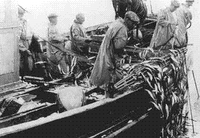
The history of fishing goes back nearly as far as the fish. Fishing history dates back to when people of ancient times began fishing for food, when pieces of bone were used as hooks and lengths of vine as line. The oldest known painting of an angler using a rod or staff comes from Egypt and history dates it from about 2000 BC. Greek philosophers Plato and Aristotle mentioned angling in their writings, and another Greek writer, Plutarch, gave tips about fishing lines. In the 2nd and 3rd centuries AD, Roman rhetorician Claudius Aelian wrote about Macedonian trout anglers using artificial flies as lures.
The methods and tackle used for fishing evolved slowly through the centuries, and not until the late 15th century did sportfishing as it is now known really begin. In 1496 the book A Treatyse of Fysshynge wyth an Angle gave specific details for the first time in English about the use of the fishing rod. Written by Dame Juliana Berners, the prioress of an abbey near Saint Albans, England, the book describes the construction of hooks and rods for angling. The manuscript also describes how to tie knots in fishing lines and how to make and use artificial lures and flies to take advantage of the feeding habits of game fish. Dame Juliana's precepts were the basis of angling knowledge in England for about 150 years.
In 1653, English angler Izaak Walton published The Compleat Angler, or the Contemplative Man's Recreation, the single most influential book ever published about sportfishing. In The Compleat Angler Walton addresses the art of constructing tackle, the science of basic aquatic biology, and the philosophy of recreational anglers. Based on a lifetime of observations, Walton's book describes the craftsmanship involved in making fishing tackle and ponders the methods anglers must use to catch game fish. Walton also gives detailed accounts of feeding habits and life cycles of different species. He believed that the true angler is one who fishes for the love of fishing and that catching fish by sporting means is far superior to other methods of fishing.
Since Walton's time, anglers have continually improved their fishing gear, tactics, and knowledge of fish behavior. At the same time, many of the sport's proponents have realized the necessity of protecting fish habitats so that the sport may continue. Notable anglers and writers who have helped to popularize the sport include two Americans: Lee Wulff, whose books contain anecdotes and intricate details about fly fishing, and A. J. McClane, the author of numerous fishing guidebooks.
Through the years, men have dominated sportfishing, but in the late 20th century women took up the sport in increasing numbers. Books by American fly-fishing instructors such as Joan Wulff have resulted in fly-fishing schools, organizations, and specially designed tackle for women. The increased participation of women has been an important part of an overall rise in tourism and business associated with sportfishing.
No comments:
Post a Comment